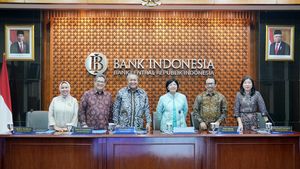JAKARTA - Economist Faisal Rachman projects that inflation will decline in the range of 3.00 percent to the rest of this year.
"We estimate that IHK inflation will reach around 3.00 percent by the end of 2023 if the government manages food prices and supply chains effectively," said Faisal in Jakarta, quoted from Antara, Sunday, September 3.
The projection is based on the controlled direction of food prices and the influence of the high base effect due to the adjustment of subsidized fuel prices in the previous year.
In addition, the latest release of data from the Central Statistics Agency (BPS) recorded that Indonesia experienced a monthly deflation (mtm) of 0.02 percent with an annual inflation rate of 3.27 percent.
BPS data states that deflation (mtm) of 0.02 percent was mainly caused by a seasonal decrease in food prices, and coincided with the harvest season.
Bank Mandiri's senior economist highlighted the increase in inflation in the education spending group, which increased from 0.66 percent (mtm) in July, to 0.86 percent (mtm) in August 2023.
The increase contributed 0.05 ppt to general inflation, mainly due to school fees for the new school year, especially in universities and elementary schools.
"We anticipate that the seasonal increase in education prices will subside gradually in the coming month as August tends to mark the peak of education inflation," said Faisal.
However, the impact of inflation on education spending groups is restrained by deflation that occurs in other spending groups.
Apart from the inflation rate which is still in the safe category, Faisal said that the government needs to anticipate the challenges of El Nino and extreme weather that could impact food inflation.
The government through the National Movement for Food Inflation Control (GNPIP) has strengthened agricultural irrigation in the regions with ministries/agencies.
The Central Inflation Control Team and the Regional Inflation Control Team (TPIP and TPIP) also continue to be encouraged to anticipate El Nino. Currently, TPIP and TPID are in 46 BI Domestic Representative Offices (KPwDN).
SEE ALSO:
Together with ministries/agencies, GNPIP also supervises and early warning systems against weather conditions. GNPIP encourages optimization of the acceleration of planting, use of dry soil varieties with the support of Agricultural Machine Equipment (Alsistan), and addition of reservoirs in the regions.
As of June 11, 2023, various supports for this step have included 9,630 market operating points, 530 thousand independent food seedlings, 31 replication clusters, 17 food downstream programs, 38 organic fertilizer programs, and the purchase of Alsistan of around Rp. 5.2 billion.
In addition, Bank Indonesia (BI)'s efforts to stabilize the rupiah exchange rate also have the potential to play an important role in managing imported inflation.
The English, Chinese, Japanese, Arabic, and French versions are automatically generated by the AI. So there may still be inaccuracies in translating, please always see Indonesian as our main language. (system supported by DigitalSiber.id)
















